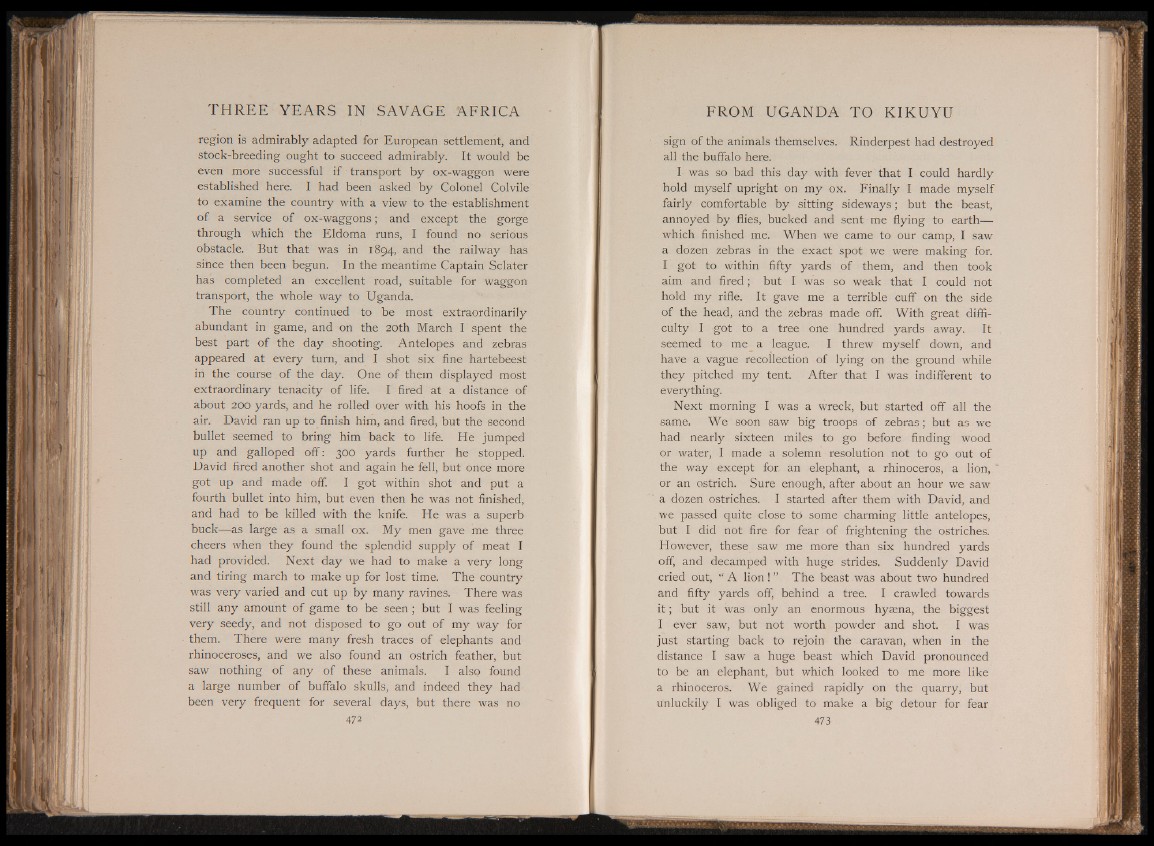
region is admirably adapted for European settlement, and
stock-breeding ought to succeed admirably. It would be
even more successful if transport by ox-waggon were
established here. I had been asked by Colonel Colvile
to examine the country with a view to the establishment
of a service of ox-waggons; and except the gorge
through which the Eldoma runs, I found no serious
obstacle. But that was in 1894, and the railway has
since then been begun. In the meantime Captain Sclater
has completed an excellent road, suitable for waggon
transport, the whole way to Uganda.
The country continued to be most extraordinarily
abundant in game, and on the 20th March I spent the
best part of the day shooting. Antelopes and zebras
appeared at every turn, and I shot six fine hartebeest
in the course of the day. One of them displayed most
extraordinary tenacity of life. I fired at a distance of
about 200 yards, and he rolled over with his hoofs in the
air. David ran up to finish him, and fired, but the second
bullet seemed to bring him back to life. He jumped
up and galloped off: 300 yards further he stopped.
David fired another shot and again he fell, but once more
got up and made off. I got within shot and put a
fourth bullet into him, but even then he was not finished,
and had to be killed with the knife. He was a superb
buck—as large as a small ox. My men gave me three
cheers when they found the splendid supply of meat I
had provided. Next day we had to make a very long
and tiring march to make up for lost time. The country
was very varied and cut up by many ravines. There was
still any amount of game to be seen ; but I was feeling
very seedy, and not disposed to go out of my way for
them. There were many fresh traces of elephants and
rhinoceroses, and we also found an ostrich feather, but
saw nothing of any of these animals. I also found
a large number of buffalo skulls, and indeed they had
been very frequent for several days, but there was no
472
sign of the animals themselves. Rinderpest had destroyed
all the buffalo here.
I was so bad this day with fever that I could hardly
hold myself upright on my ox. Finally I made myself
fairly comfortable by sitting sideways; but the beast,
annoyed by flies, bucked and sent me flying to earth—
which finished me. When we came to our camp, I saw
a dozen zebras in the exact spot we were making for.
I got to within fifty yards of them, and then took
aim and fired; but I was so weak that I could not
hold my rifle. It gave me a terrible cuff on the side
of the head, and the zebras made off. With great difficulty
I got to a tree one hundred yards away. It
seemed to me a league. I threw myself down, and
have a vague recollection of lying on the ground while
they pitched my tent. After that I was indifferent to
everything.
Next morning I was a wreck, but started off all the
same. We soon saw big troops of zebras; but as we
had nearly sixteen miles to go before finding wood
or water, I made a solemn resolution not to go out of
the way except for. an elephant, a rhinoceros, a lion, *
or an ostrich. Sure enough, after about an hour we saw
a dozen ostriches. I started after them with David, and
we passed quite close to some charming little antelopes,
but I did not fire for fear of frightening the ostriches.
However, these saw me more than six hundred yards
off, and decamped with huge strides. Suddenly David
cried out, “ A lion ! ” The beast was about two hundred
and fifty yards off, behind a tree. I crawled towards
i t ; but it was only an enormous hyaena, the biggest
I ever saw, but not worth powder and shot. I was
just starting back to rejoin the caravan, when in the
distance I saw a huge beast which David pronounced
to be an elephant, but which looked to me more like
a rhinoceros.’ We gained rapidly on the quarry, but
unluckily I was obliged to make a big detour for fear